旅游英语第01章
unit1 旅游英语
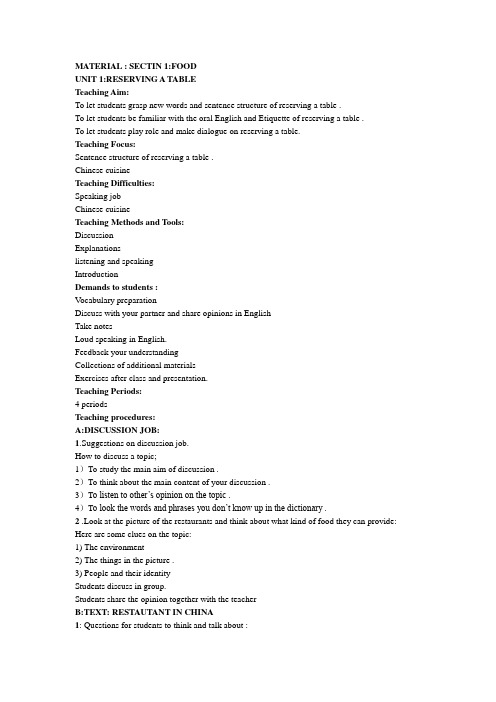
MATERIAL : SECTIN 1:FOODUNIT 1:RESERVING A TABLETeaching Aim:To let students grasp new words and sentence structure of reserving a table .To let students be familiar with the oral English and Etiquette of reserving a table .To let students play role and make dialogue on reserving a table.Teaching Focus:Sentence structure of reserving a table .Chinese cuisineTeaching Difficulties:Speaking jobChinese cuisineTeaching Methods and Tools:DiscussionExplanationslistening and speakingIntroductionDemands to students :V ocabulary preparationDiscuss with your partner and share opinions in EnglishTake notesLoud speaking in English.Feedback your understandingCollections of additional materialsExercises after class and presentation.Teaching Periods:4 periodsTeaching procedures:A:DISCUSSION JOB:1.Suggestions on discussion job.How to discuss a topic;1)To study the main aim of discussion .2)To think about the main content of your discussion .3)T o listen to other’s opinion on the topic .4)T o look the words and phrases you don’t know up in the dictionary .2 .Look at the picture of the restaurants and think about what kind of food they can provide: Here are some clues on the topic:1) The environment2) The things in the picture .3) People and their identityStudents discuss in group.Students share the opinion together with the teacherB:TEXT: RESTAUTANT IN CHINA1: Questions for students to think and talk about :What do you think about Chinese food ? do you like it or not ?Why are Chinese food so popular in the world ?What kind of Chinese food do you like best ? why ?4) Talk about the main idea of the test.2: Text presentation :Para 1: Restaurant in chinaPara 2: Guangdong foodPara 3: Sichuan foodStudents read and translate the text into Chinese paragraph by paragraph .3.Some words explaining and sentence structure :Individual :single ,separatelyLikely: probably;Typical roadside eateries :particular type of characteristic.Base on : base historical event this book is believable .;Court: official resident of a soveneigt Reputation :fame ;Blend :mix ;Refine :carefully selected ;Ingredients ;materialRefreshing : give some new taste to ..;Adapt : to make sth suitable for new …Flavoring :taste ;Be famous for :be noted for ;Be well-knownDistinct: easily to seen or to understand .3.Exercise on text:Questions on the text .Translation .C.LISTENING AND SPEAKING JOB:1.Dialogue : listen to the recording and finish the dialogue.2.Memorization: memorize the dialogue and practice it with your partner3.Role play:Situation 1In a group of three or four ,work out a restaurant reservation form first by yourselves and then play different roles as waiter /waitress and guests to make reservation in a restaurant .Situation 2You are an American ;you want to hold a farewell party in a Chinese restaurant Beihai restaurant .on Friday evening for 10 people .make a reservation in a restaurant .Students do the role play job to practice the sentence structure.D.CULTURAL NOTES ADDITIONAL KNOWLEDGE:1.Etiquette of reserving table serve:GreetingAsking the reservation timeTo know under whose name the reservation is ?The number in the partyTo know the kinds of dishes reserved.To see if there are any special requestsConfirmationThanks and goodbyeE:HOMEWORK:1.To recite the sentence structure of this unit2.To do the exercises on the notebook3.To prepare for the new unitMATERIAL: SECTIN 1:FOODUNIT 2: RECEIVING GUESTTeaching Aim:To let students grasp new words and sentence structure of receiving guests .To let students be familiar with the oral English and the etiquette of receiving guests .To let students play role and make dialogue on receiving guests .Teaching Focus:Sentence structure of receiving guests .Chinese dinner table etiquetteTeaching Difficulties:New words and expressionsRole play fobTeaching Methods and Tools:DiscussionExplanationslistening and speakingIntroductionDemands to students :V ocabulary preparationDiscuss with your partner and share opinions in EnglishTake notesLoud speaking in English.Feedback your understandingCollections of additional materialsExercises after class and presentation.Teaching Periods:4 periodsTeaching procedures:A:DISCUSSION JOB:1 .Look at the picture of the restaurants and think about the following topics:Why would the gests want different seating position in a restaurant ?For convenience , for a quiet place , for a good view , they like smoke ,To be undisturbed ,want to danceNow you guests are facing a long wait in line in our restaurant .discuss with your partner what you can tell your guests to help them avoid the wait and what they can do while waiting the following are your references :How can you avoid the long lines at popular theme restaurant ?What should you do if faced with a long wait ?2.Students discuss .3.Students show their opinion.B:TEXT: RESTAUTANT IN CHINA1: Questions for students to think and talk about :Generally ,how many people reserve table when they plan to eat out ?Have you any idea about reserve a table via internet ?2: Text presentation :Para 1: The new alternative to call-ahead seating .Para 2: Double your exposure.Para 3: Affiliate restaurant .Para 4: Advanced seatingPara 5: Cell phone confirmation.Students read and translate the text into Chinese paragraph by paragraph .3.Some words explaining and sentence structure :PDA: personal digital assistant ;Advanced seating ;Confirm v :to make surePromptly adv quickly ; View ,n; Zip codeHome page :from the very beginning of ;Affiliate ,v members of ; Hostess, nDatabase ,n a collection of figures ;Monitor ,n ; Insert ,vApporopriate :suitable ,right or proper.; Alternative to :substitute of sthEg :Have you find any alternative way to punishing him ?;Advance : before the timeVia : by the way through; Eg: I can send him a letter via e –mailConfirmed : to make sure ; Seated ; to be seatedUnlike : not like; Eg: They are so unlike that nobody believe they are twinsHis latest novel is quite unlike his earlier work.Frustration : complex ;Allow … to …; Eg: Nobody is allowed to touch this book .Multiple : many kinds or types of ;Add to Eg; I have nothing to add to my earlier statement ; Lost to : be defeated ; fail to do Appropriate ;suitable ;right to do ; and proper ;Prior to : coming before in time; Eg: you should go into the classroom prior to the teacher .3.Exercise on text:Questions on the text .Translation .C.LISTENING AND SPEAKING JOB:1.Dialogue : listen to the recording and finish the dialogue.2.Memorization: memorize the dialogue and practice it with your partner3.Role play:situation 1 : two walk in guests come to your restaurant at pesk hours they need to wait at least 15 minutes .Explain to them and take to them to the lounge .then seat then at a table neat the danve floor .Situation 2: A couple come to your restaurant without a reservation .They want to sit by the third floor window to table a nice view .But that table has been booked .your guests really want to dine at that table because it is the place where they met for the first time .Make arrangement for them . Students talk about how to do the discussion job and finish the dialogue .Students do the role play job in pairs using the sentences in the references .D.CULTURAL NOTES ADDITIONAL KNOWLEDGE::1.food and eating etiquette :Family MealsThe Stuff of the MealPlace Settings and Serving EtiquetteWho Eats When and HowWhile EatingRules for DrinkingAccompanimentsPaymentE:HOMEWORK:1.To recite the sentence structure of reserving guests .2.To be familiar with the cultural notes .3.To prepare for the new unitMATERIAL : SECTIN 1:FOODUNIT3:TAKING ORDERSTeaching Aim:To let students grasp new words and sentence structure of taking orders..To let students remember the name of the popular dishes in China and in Gansu province . To let students play role and make dialogue taking orders..Teaching Focus:sentence structure of taking orders..Chinese cuisine and Chinese dishes and Gansu dishes .Teaching Difficulties:Speaking jobChinese cuisine and Chinese dishes and Gansu dishesTeaching Methods and :DiscussionIntroductionExplanationslistening and speakingDemands to students :V ocabulary preparationDiscuss with your partner and share opinions in EnglishTake notesLoud speaking in English.Feedback your understandingCollections of additional materialsExercises after class and presentation.Teaching Periods:4 periodsTeaching procedures:A:DISCUSSION AND INTRODUCTION JOB:1.Suggestions on discussion job.2. Look at the picture of the restaurants and talk about the dishes in the picture ;Red cooked eggplantFried crabs in chilli saucesKungpao chickenStudents discuss the dishes and report the conclusion3.look at the following vegetables and name them:Tomato spinach cucumber turnip broccoli red cabbageLettuce squash mint potato sproutsGarlic carrot peas radish okraOnion cauliflowers mushroom string beans4.DVD show :the etiquette of food service:Students read the vegetables and recite the vegetablesB: TEXT :TRY THE ANTHENTIC FOOD.1: Questions for students to think and talk aboutHow much do you know about chinese famous dishes ,can you list some of them?How much do you know about Gansu popular dishes ?Why chinese cuisine is a part of chinese culture?2: Text presentation :Para 1:Try the authentic food .Para 2: Food and chinese culturePara 3: Famine and hardshipPara 4: Energy savingStudents read and translate the text into Chinese paragraph by paragraph .3.Some words explaining and sentence structure :Differ from ; Eg :The climate is differ from north to south in china .Trying out ;Eg : He just got a new bike and now he is trying out ,At all levels of society :people from all walks of lifeFair : quite ; Mental : about mind ,the process of thinkingWell being :the state of feeling health and happy ; Combine : exist together ;join togetherPlay a large role : Luxun play a large role in the history of literature of china .Edible : fit to be eaten ; Lean: poor harvest year ; Turn out to be : to become toPrompted : urge to ,incite ; Current: of the present time ; Conserve : keepDelights: give great pleasure satisfaction happiness3.Exercise on text:Questions on the text .Translation .C.LISTENING AND SPEAKING JOB:1.Dialogue : listen to the recording and finish the dialogue.2.Memorization: memorize the dialogue and practice it with your partner3.Role play:Situation 1 : work in a group of three or four and work out a menu together ,then play different roles as waiter and customers to take orders in a restaurant .You can decide whether it is chineses or westernSituation 2: you are waiter of a Chinese restaurant .your take is to recommend the specialty like ma pod u fu to your group mates who just arrived in china .Students do the role play job in pairs using the sentences in the references .D.CULTURAL NOTES ADDITIONAL KNOWLEDGE:1.Introduction on Chinese cuisineChinese food enjoys a high reputation in the world also for its sheer abundance. It is due to the diversity of the climate, products and customs that there are widely different food styles and tastes in local regions.Beijing cuisine ;Shandong Cuisine; Sichuan Cuisine ;Guangdong Cuisine ;Fujian Cuisine ;Jiangsu CuisineJ;Zhejiang Cuisine;Hunan Cuisine2. Introduction on Gansu cuisine and Dunhuang cuisine:Gansu famous cuisine:金鱼发菜兰州烤小猪核桃丸子百合桃兰州八宝百合玛瑙海参油爆驼峰Dunhuang cuisine:The new 8 Chinese cuisine of local style雪山驼掌九色鹿河西花馍荷香蒸羔羊3.Introduction on chinese and west dinner:Western breakfast, western lunch,and western dinnerChinese breakfast, Chinese lunch and Chinese dinnerE:HOMEWORK:1.To recite the popular chinese dishes and Gansu dishes:2.To recite the role play job of taking orders .MATERIAL: SECTIN 1:FOODUNIT 4: BEVERAGESTeaching Aim:To let students grasp new the main beverages in china and western .To let students play role and make dialogue of introducing beverages.Teaching Focus:Words of beveragesTo Introduce beveragesTeaching Difficulties:Words of beveragesTeaching Methods :DiscussionIntroductionExplanationslistening and speakingDemands to students :V ocabulary preparationDiscuss with your partner and share opinions in EnglishTake notesLoud speaking in English.Feedback your understandingCollections of additional materialsExercises after class and presentation.Teaching Periods:4 periodsTeaching procedures:A:DISCUSSION JOB:1.Suggestions on discussion job.2. Look at the picture .Do you know the following wines ?discuss with in your group about their producing areas and tastes .Wines:Bordeaux., Chablis, Chianti, Lambrusco, Liebfraumilch, Muscadet, Rioja, Sauternes,3.Discuss with your partner the beverage menu in Chinese restaurant ?.What are some of the item an the beverage list ,Is it classified into soft and alcoholic drinks ?What are the items of each type? Students discuss the dishes and report the conclusion.Students discuss in group.Students share the opinion together with the teacherB: TEXT THE ART OF WINE.1: Questions for students to think and talk about:What is usually included in a restaurant’s ‘drink list”?What do chinese people drink at dinner ?How much do you know about tea ?2: Text presentation :Para 1: Wine listPara 2-4: Old World wine and New World winePara 5: Wine and serving temperature .Para 6: Wine and food .Students read and translate the text into Chinese paragraph by paragraph .3.Some words explaining and sentence structure :Generally speaking :Available :that can be used or obtained.By means of :with the help of ; by using sthBring out: show sth clear ,reveal sth ;As to :regarding to ;As well:Worth mention :;In other words ;As to ;Is combine with ;Are supposed toAnd so on ; Students take notes on the presentation of the text .3.Exercise on text:Questions on the text .Translation .C.LISTENING AND SPEAKING JOB:1.Dialogue : listen to the recording and finish the dialogue.2.Memorization: memorize the dialogue and practice it with your partner3.Role play:Situation1: You are a restaurateur .with the help of a sample beverage list ,work out a beverage list of your own.Situation2: You are a waiter /waitress in a restaurant .your guests want you to recommend some drinks to go with their dishes .your guests ordered lobster ,prawn and some other seafood, give them some suggestions .Think of other kinds of dishes that your guests might order and what drinks to suggest .Students do the role play job in group using the sentences in the references .D.CULTURAL NOTES ADDITIONAL KNOWLEDGE:1.Introduction on cold non alcoholic drinksSoda , Sirups, Water ,Fruit Juices, Beers, Coffee,Tea2.Introduction on wine :Aperitifs, Whisky, Cocktails, Aperitifs, Cognac, Gin, Vodka, Rum ,Korean Soshu Japanese sake3.Chinese tea and tea culture:The Categories of TeaChina's Tea-Producing AreasAdvantages of Tea-DrinkingTea ProductionTea artE.HOMEWORK:1.To recite beverages2.To introducing beverages after class .MATERIAL : SECTIN 1:FOODUNIT 5: PAYMENTTeaching Aim:To let students grasp new words and sentence structure of payment.To let students understand the words and sentence structure of payment.To let students play role and make dialogue of paying.Teaching Focus:Sentence structure of payment .Teaching Difficulties:The sentence structure of payment .Role play jobTeaching Methods and :DiscussionIntroductionExplanationslistening and speakingDemands to students :V ocabulary preparationDiscuss with your partner and share opinions in EnglishTake notesLoud speaking in English.Feedback your understandingCollections of additional materialsExercises after class and presentation.Teaching Periods:4 periodsTeaching procedures:A:DISCUSSION AND INTRODUCTION JOB:1.Suggestions on discussion job.2. Look at the picture of coins: How much do you know about the following :Penny , cent , nickel, dime, a quarter,3.Do you know the following cards?Are the following acceptable in your restaurant ?1: Questions for students to think and talk about:What is usually included in a restaurant’s ‘drink list”?What do chinese people drink at dinner ?How much do you know about tea ?Students discuss in group.Students share the opinion together with the teacherB: TEXT WHO WILL PAY THE BILL.1: Questions for students to think and talk about:How do you think about the chinese etiquette of payment ?What do you know about the western etiquette of payment ?2: Text presentation :Main idea of the text: The chinese custom of paying for the billStudents read and translate the text into Chinese paragraph by paragraph .3.Some words explaining and sentence structure :Foot :be responsible for paying the cost of ; Issue :send out /make something knownIn the first place : first ;End up :end ; Eg: If you continue to steal you will end up in prison .Encounter :meet ,have the kind of chance .; Stand treat : to be the host .For some reason ; Convincingly : make somebody certain / cause to realizeIf they can help it : if it is possibleDeclaring that you will pay will not save you from this battle :;Save :means set somebody free . Determined to do : decided to do something successfully ; Eg : I am determined to succeed .So stay alter towards the end of the meal and.Stay alter :to stay attentive and quick to think or act ..Alter : v .warn to watch for danger ;Alter : n. special watchfulness before fight or during an attack Make a trip : Star treatment :This advice will serve you well until you encounter the situation where both you and another person really want to stand treat .Where: in which ;Eg: Government will issue a new law where (in where )smoking in public places is forbidden .Students take notes on the presentation of the text .3.Exercise on text:Questions on the text .Translation .C.LISTENING AND SPEAKING JOB:1.Dialogue : listen to the recording and finish the dialogue.2.Memorization: memorize the dialogue and practice it with your partner3.Role play:Situation 1:The guest have finished the meal .They ordered a steak (35 yuan ) ,a bean dish(20yuan )and a fruit salad (25yuan )and two glasses of wine (60yuan ).They want to settle the bill by credit card ,but your restaurant only accepts cash. Explain the bill to your guest .Situation 2:Waiter : Your guest’s meal costs him 125yuan .Your guest showed you a 50 yuan coupon from your restaurant .tell him the coupon expired last weekend .but you can offer him a newly issued 20yuan coupon since his bill exceed 100yuan .Guest : You and your wife finished your meal and you called the waiter to settle your bill.It happened you had a 50 yuan coupon from the restaurant with you .Ask the waiter if you can used it and pay the rest in cash.Students do the role play job in group using the sentences in the references .D.CULTURAL NOTES :1.The cultural of tipping in western world.2.The custom of chinese : Who will pay for the bill ?3.The currency of the the main countryE. HOMEWORK:1.To recite the new words of payment.MATERIAL : SECTIN 1:FOODUNIT 6: MAKING CAMPLAINTSTeaching Aim:To let students grasp sentence structure of the complaints from guest.To let students understand the etiquette and the sentences of dealing with complaints .Teaching Focus:Etiquette and the sentences of dealing with complaints .Teaching Difficulties:The situation of making complaintsetiquette and the sentences of dealing with complaints .Teaching Methods :DiscussionIntroductionExplanationslistening and speakingDemands to students :V ocabulary preparationDiscuss with your partner and share opinions in EnglishTake notesLoud speaking in English.Feedback your understandingCollections of additional materialsExercises after class and presentation.Teaching Periods:4 periodsTeaching procedures:A:DISCUSSION JOB:1.Suggestions on discussion job.2. Look at the picture .Have you ever had unpleasant experience in a restaurant ? Did you make a complaints ? How was it handled? Share your experience with your group?3.Discuss the cartoon with your partner. What is the guest complaining about ?How does the waiter respond? If you were the Guest or the waiter , what would you do afterwards ?Students discuss in group.Students share the opinion together with the teacherB: TEXT COMPLAINTS FROM THE GUESTS.1: Questions for students to think and talk about:How to handled the complaints from guest?What good can you get from the guest’s complaints ?2: Text presentation :Para 1:Cashing in on complaints : turning disappointed diner into gold.Para 2:Understandguest economicsPara 3:Keep score on service .Para 4:Handled complaints comstructively.Students read and translate the text into Chinese paragraph by paragraph .3.Some words explaining and sentence structure :How to mine it :use ir correctly ; Positively a; Tap vThere is gold in those complaints :chance of getting money .In turn :pay back ; Affront v; Patronage n; Irritation : stir anger .Prosper :a ; Loyal a ;Confront ; Improve v.; Monitor v; Break down ;Feedback n3.Exercise on text:Questions on the text .Translation .C.LISTENING AND SPEAKING JOB:1.Dialogue : listen to the recording and finish the dialogue.2.Memorization: memorize the dialogue and practice it with your partner3.Role play:Situation 1: There is a fly in the soup ,the guest become angry because of this .your are an waiter .you want to handled this situation politely and correctly .Situation 2:Here are some words of complaints . study them to see if there are some complaints to add and then discuss with your partner the way to settle complaintsStudents do the role play job in pairs using the sentences in the references .D.CULTURAL NOTES ADDITIONAL KNOWLEDGE:1.Sentences from the reference of complaints2.Talk about the differences between chinese food etiquette and western food etiquette .E. HOMEWORK:1.To recite the sentences in the references .2.To prepare for next unit .。
第一章 unit 1 《新编旅游英语教程》 PPT课件
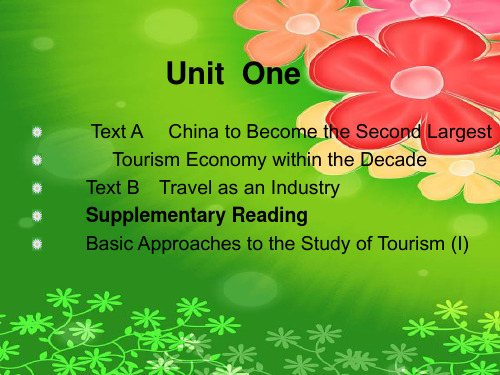
confine fare charter supply accessible location cruise excursion freighter ferry
v. n.
v. n.
adj. n. n.
n. n. v.
限制, 禁闭 费用, 旅客, 食物
租, 包(船、车等) 补给, 供给, 供应品
易接近的, 可到达的 位置, 场所, 特定区域 巡游, 巡航
Text B Travel as an Industry
Notes
Using smaller airplanes, air taxi companies fly passengers or supplies to destinations that may not be accessible to scheduled air carriers. 飞机出租公司用小型飞机把乘客或 货物运送到航空公司无法抵达的地方。 Oslo奥斯陆:是挪威首都和最大的城市。 1952年冬季奥林匹克运动会在此举行。
游览,短途旅行 货船 渡运, (乘渡船)渡过, 运送
Text B Travel as an Industry
riverboat
n.
内河船
underpinning n.
基础, 支柱, 支撑
rental
adj.
租用的
limousine
n.
豪华轿车
mass
adj.
大规模的, 集中的, 群众的
transit
Text A China to Become the Second
Largest Tourism Economy within the
Decade
Notes
《旅游英语》配套的课件Unit 1
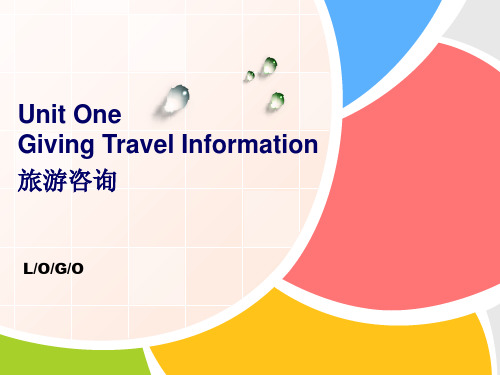
about travel information; • ——get some cultural knowledge about travel
information; • ——find ways to improve your writing skills
we’ll contact you by telephone. • 5. Will you please sign there, on _ the upper left-hand side_?
参考译文
• A:您好,要预订船票吗? • B:下星期有开往汉堡的船吗? • A:有,下星期三纽卡斯尔号将由南安普顿开往汉堡。 • B:好的,能给我订一间二人船舱吗? • A:我看一下。是的,可以〔指船舱位置图表〕这间怎么样? • B:这间很好,我订了。 • A:请您填好这张卡片。 • B:〔填好之后〕好了,给您。 • A:请您坐等一下,我来填写票单,只一会儿就好。 • B:那劳驾了。 • A:这是您的票。一共50英镑。 • B:给您钱。我们什么时间可以登船呢?您能告诉我怎么样登船吗?有登船专列吗?如果有的话,
Ming Tomb • 2. What are the characteristics of the landscape in Guilin? • The landscape is characterized by terraced rice paddies, water
buffalos, and bamboo groves, and peasants with turn up trousers and cone-shaped straw hats. • 3. Give a brief introduction to the Yangtze River. • Yangtze River is the largest river in China, the lifeline of China, which flows through nine provinces, with its 700 tributaries, covers an area of 1.8 million sq. km, which is 19 percent of the total area of China. • 4. Which city is known as the “City of the Sun〞? • Lhasa. • 5. What are the ancient mysteries of the Silk Road people can discover? • Bazaars where merchants haggle over camels and carpets, where you can meet the nomadic minorities of China, and
【旅游英语】Unit 1 Meeting the Guests
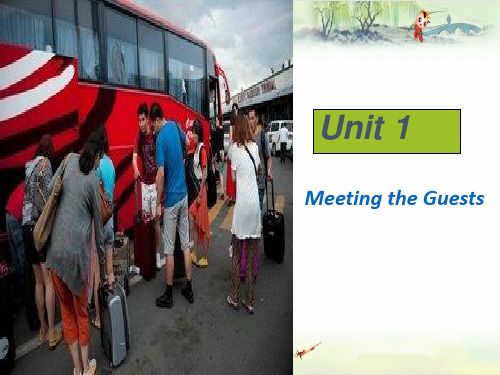
Notes Note 1 China International Tour Service (CITS) 中国国际旅行社
中国国际旅行社总社有限公司(China International Travel Service Limited, Head Office),前身中国国际旅行社总社(China International Travel Service Head office),英文 缩写:CITS,成立于1954年,是目前国内规模 最大、实力最强的旅行社企业集团,荣列国 家统计局公布的 " 中国企业500 强 " ,是500 强中唯一的旅游企业,现为中国国旅股份有 限公司旗下两大企业之一。
• C: Yes. I’m Lee White. This is Tom Bright. • A: Nice to meet you! I’m coming to meet you. Welcome you all to China. • B and C: Nice to meet you, too, Mr. Li. • A: Do you have all your luggage, Mr. White and Mr. Bright? • B: Yes, both of us only have a backpack. • A: Great. I believe you two will have a very pleasant stay here. • B: Thank you. • A: Our car is outside. Let’s drive straight to our hotel, shall we? • B: Excellent. Let’s go.
tour guide badge/ pass
旅游英语课件Unit 1 Travel and Tourism
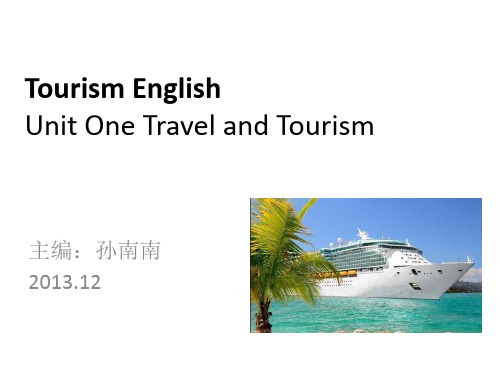
主编:孙南南 2013.12
Section A Passage Reading
Text A Travel Agency
Background Information:
1. Thomas Cook 近代旅游业之父 In 1841, as secretary of the South Midland Temperance
Section A Passage Reading
Text B Independent Travel
New Word: resident [ 'rezidənt ] n. 居民 bulk [ bʌlk ] n. 大部分,大块,容量 facility [ fə'siliti ] n. 设施,设备 book [ buk ] v. 预定,登记 at short notice 在短时间内,立刻 transfer [ træns'fə: ] n. 转让,转移,传递 baggage [ 'bægidʒ ] n. 行李
Package holidays are organized by a tour operator and sold to a consumer by a travel agent. Some travel agents are employees of tour operators, others are independent.
Association, Thomas Cook persuaded the Midland Countries Railway Company to run a special train between Leicester and Loughborough for a temperance meeting on July 5. He organized an excursion for his members at a fare of one shilling return. It turned out to be an immediate success—altogether 570 seats were sold. For his efforts Cook received a 5 percent commission. Although not the first excursion train run in England, it was believed to be the first publicly advertised excursion train organized by a middleman. Thus Thomas Cook ct rail excursion agent whose pioneering efforts were eventually to be copied widely in all parts of the world.
旅游英语教程 Unit 1
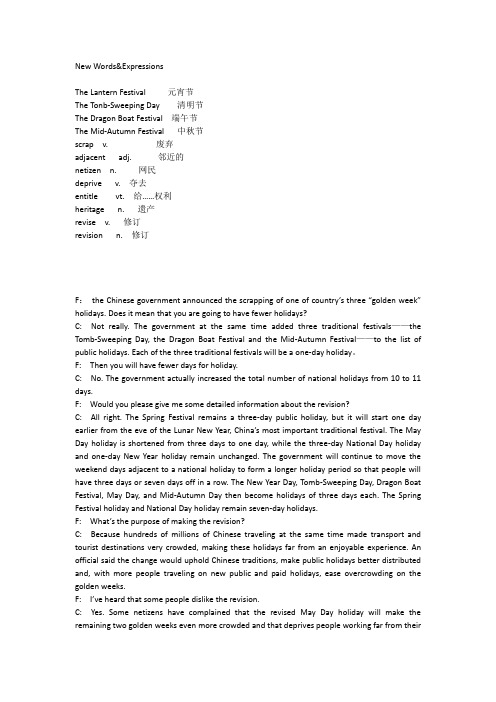
New Words&ExpressionsThe Lantern Festival 元宵节The Tonb-Sweeping Day 清明节The Dragon Boat Festival 端午节The Mid-Autumn Festival 中秋节scrap v. 废弃adjacent adj. 邻近的netizen n. 网民deprive v. 夺去entitle vt. 给……权利heritage n. 遗产revise v. 修订revision n. 修订F:the Chinese government announced the scrapping of one of country’s three “gol d en week” holidays. Does it mean that you are going to have fewer holidays?C: Not really. The government at the same time added three traditional festivals——the Tomb-Sweeping Day, the Dragon Boat Festival and the Mid-Autumn Festival——to the list of public holidays. Each of the three traditional festivals will be a one-day holiday。
F: Then you will have fewer days for holiday.C: No. The government actually increased the total number of national holidays from 10 to 11 days.F: Would you please give me some detailed information about the revision?C: All right. The Spring Festival remains a three-day public holiday, but it will start one day earlier from the eve of the Lunar New Year, China’s most important traditional festival. The May Day holiday is shortened from three days to one day, while the three-day National Day holiday and one-day New Year holiday remain unchanged. The government will continue to move the weekend days adjacent to a national holiday to form a longer holiday period so that people will have three days or seven days off in a row. The New Year Day, Tomb-Sweeping Day, Dragon Boat Festival, May Day, and Mid-Autumn Day then become holidays of three days each. The Spring Festival holiday and National Day holiday remain seven-day holidays.F: What’s the purpose of making the revision?C: Because hundreds of millions of Chinese traveling at the same time made transport and tourist destinations very crowded, making these holidays far from an enjoyable experience. An official said the change would uphold Chinese traditions, make public holidays better distributed and, with more people traveling on new public and paid holidays, ease overcrowding on the golden weeks.F: I’ve heard that some people dislike the revision.C: Yes. Some netizens have complained that the revised May Day holiday will make the remaining two golden weeks even more crowded and that deprives people working far from theirhometowns of the chance to go back home for family gatherings. They have even voiced their worry that a lot of company employees will not be off on the newly-added traditional festival holidays.F: Does the government know that?C: Yes. The spokesman said the revision could not satisfy all the people, whose interests might vary, but did respect the opinion of a majority. He said that 75 percent of the people were in favor of the change and that 60 percent of the netizens agreed to the way the May Day holiday was revised.F: I had paid holidays when I worked in my country. Do people have paid holidays in China? C: Yes. All employees of government agencies, enterprise and public-service institutions are entitled to take paid holidays after serving the same employer for one year. Employees who have worked for ten to 19 years will have ten days and those who have worked for 20 years and above would have 15 days.F: That’s wonderful.。
《旅游英语》第一章Travel Arrangement

2 Task Description
8
I Task Description
Discussion: 1. As a tour guide , how would you begin your work when you get the reception program from the travel agency? Dou you know the full form of CITS?
program from the travel agency. Making tour arrangements as following:
The four-day travel in Shanxi.
2. Could you list the tourist sites mentioned in this passage?
Mount Wutaishan, Yungang Grottoes, the Pingyao Ancient City
9
Ⅱ Task Description
China International Travel Service
tour guide
coach
itinerary
10
Ⅱ Task Description As a tour guide, you begin your work when you get the reception
houses in northern China. From this tour, you will appreciate the beautiful landscape
in Shanxi. In _a_d__d_i_t_i_o_n__, you will get to know a little about Buddhism and its culture. You will also appreciate the classic folk houses, which may v__a_r_y_______ from those south of the Yangtze River, and u_n__d_e__r_s_t_a_n_dMerchant Culture of Shanxi, which exerted a great __in__f_lu__e_n__c_eon the Chinese modern history. So the four-day tour will give you a glimpse of many __a_s_p_e__c_t_s__ of Chinese culture.
新职业英语旅游英语Unit 1 ppt课件

旅游 Unit 1 Marketing and Preliminary Work 英语
Task 12
旅游 Unit 1 Marketing and Preliminary Work 英语
Task 1 Being a tour guide, you should know what to prepare before
旅游 Unit 1 Marketing and Preliminary Work 英语
Reading A
Task 1 Match each type of tourism with its corresponding picture.
Try to describe them in English briefly.
(c)— Agritourism: It is the practice of attracting travelers or visitors to an area or areas used primarily for agricultural purposes.
旅游 英语
T Unit 1 Marketing and Preliminary Work
Reading A
2. timeshare
A timeshare is a form of ownership or right to the use of a property. The property is typically in a resort area, and multiple parties hold rights to use it. Each sharer is allotted a period of time (typically one week, and almost always the same time every year) in which they may use the property.
旅游英语Unit+1+Tourism+and+Tour+Guides4

Professionalism
• represent not only your personal appearance and behavior but that of your company as well as your country. • depend on the way you dress yourself, your ability to use and understand languages, your manners and social skills and your attitude toward your work and the people you are providing services to. In general , your professionalism is your appropriate behavior when you are conducting a tour.
• A Teacher
• help inbound tourists learn and understand the history, culture, traditions and important ideas of your city as well as China.
• An Entertainer
• Jobs done by Tour Guides
• navigating, communicating, interpreting, rolemodeling appropriate behavior, entertaining, treating injury, ensuring safety, managing disasters etc.
• make yourself a humorous entertainer, not a stage actor but a friendly, active, high-spirited person to help your guests enjoy their travel.
旅游英语第一章
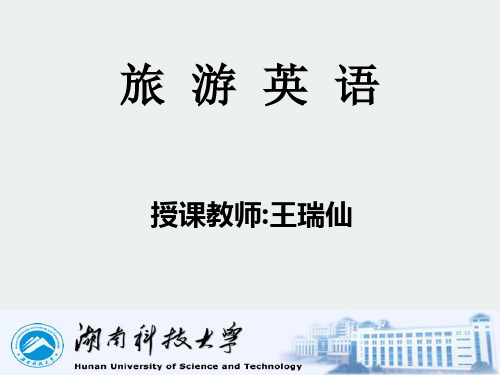
授课教师:王瑞仙
Arrangement
• Tourist English • Hotel English
Unit 1
Dialogs
1. Passport, please!
• economic reform • 经济改革 • open-up policy • 对外开放政策 • Sorry to have kept you waiting. • How long do you plan to stay?
• Please assure your friends that I’ll be doing all that is within my power to make your visit in shanghai a pleasant experience.
• Thank you for your understanding and cooperation.
• belong • finalize • actualization • ample • pious • enviable • affluent
• 为…所有,是…的成员 • 把…最后定下来 • 实现,现实化 • 足够的,充分的 • 虔诚的,信奉宗教 • 值得羡慕的 • 丰富的,富裕的
Useful expressions
• To be the first to go to an exotic place, or to go where certain types
of people go, offers some excitement and creates an illusion of enviable sophistication among one’s friends.
旅游英语课件 Tourism
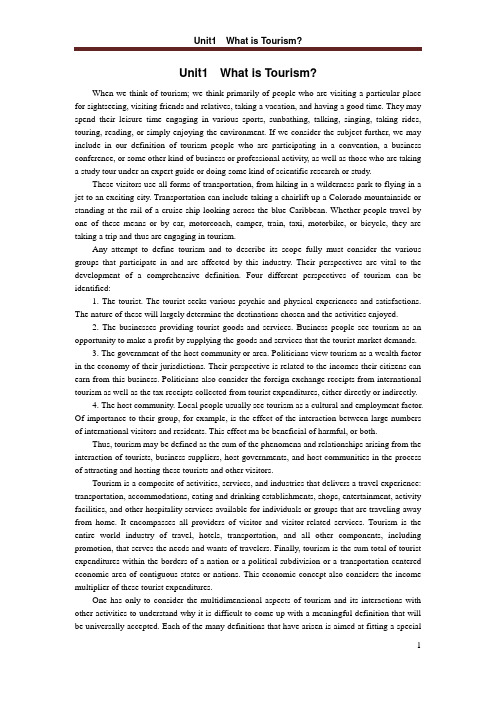
Unit1 What is Tourism?When we think of tourism; we think primarily of people who are visiting a particular place for sightseeing, visiting friends and relatives, taking a vacation, and having a good time. They may spend their leisure time engaging in various sports, sunbathing, talking, singing, taking rides, touring, reading, or simply enjoying the environment. If we consider the subject further, we may include in our definition of tourism people who are participating in a convention, a business conference, or some other kind of business or professional activity, as well as those who are taking a study tour under an expert guide or doing some kind of scientific research or study.These visitors use all forms of transportation, from hiking in a wilderness park to flying in a jet to an exciting city. Transportation can include taking a chairlift up a Colorado mountainside or standing at the rail of a cruise ship looking across the blue Caribbean. Whether people travel by one of these means or by car, motorcoach, camper, train, taxi, motorbike, or bicycle, they are taking a trip and thus are engaging in tourism.Any attempt to define tourism and to describe its scope fully must consider the various groups that participate in and are affected by this industry. Their perspectives are vital to the development of a comprehensive definition. Four different perspectives of tourism can be identified:1. The tourist. The tourist seeks various psychic and physical experiences and satisfactions. The nature of these will largely determine the destinations chosen and the activities enjoyed.2. The businesses providing tourist goods and services. Business people see tourism as an opportunity to make a profit by supplying the goods and services that the tourist market demands.3. The government of the host community or area. Politicians view tourism as a wealth factor in the economy of their jurisdictions. Their perspective is related to the incomes their citizens can earn from this business. Politicians also consider the foreign exchange receipts from international tourism as well as the tax receipts collected from tourist expenditures, either directly or indirectly.4. The host community. Local people usually see tourism as a cultural and employment factor. Of importance to their group, for example, is the effect of the interaction between large numbers of international visitors and residents. This effect ma be beneficial of harmful, or both.Thus, tourism may be defined as the sum of the phenomena and relationships arising from the interaction of tourists, business suppliers, host governments, and host communities in the process of attracting and hosting these tourists and other visitors.Tourism is a composite of activities, services, and industries that delivers a travel experience: transportation, accommodations, eating and drinking establishments, shops, entertainment, activity facilities, and other hospitality services available for individuals or groups that are traveling away from home. It encompasses all providers of visitor and visitor-related services. Tourism is the entire world industry of travel, hotels, transportation, and all other components, including promotion, that serves the needs and wants of travelers. Finally, tourism is the sum total of tourist expenditures within the borders of a nation or a political subdivision or a transportation-centered economic area of contiguous states or nations. This economic concept also considers the income multiplier of these tourist expenditures.One has only to consider the multidimensional aspects of tourism and its interactions with other activities to understand why it is difficult to come up with a meaningful definition that will be universally accepted. Each of the many definitions that have arisen is aimed at fitting a specialsituation and solving an immediate problem, and the lack of uniform definitions has hampered study of tourism as discipline. Development of a field depends on (1) uniform definitions, (2) description, (3)analysis, (4) predictions, and (5) control.Modern tourism is a discipline that has only recently attracted the attention of scholars from many fields. The majority of studies have been conducted for special purposes and have used narrow operational definitions to suit particular needs of researchers or government officials; these studies have got encompassed a systems approach. Consequently, many definitions of “tourism” and “the tourist” are based on distance traveled, the length of time spent, and the purpose of the trip. This makes it difficult to gather statistical information that scholars can use to develop a database, describe the tourism phenomenon, and do analyes. The problem is not trivial. It has been tackled by a number of august bodies over the years, including the League of Nations, the united Nations, the World Tourism Organization (WTO), the Organization for Economic Cooperation and Development (OECD),the National Tourism Resources Review Commission, and the U.S. Senate’s National Tourism Policy Study.World Tourism OrganizationThe international Conference of Travel and Tourism Statistics convened by the World Tourism Organization (WTO) in Ottawa, Canada, in 1991 reviewed, updated, and expanded on the work of earlier international groups. The ottawa Conference made some fundamental recommendations of definitions of tourism, travelers and tourists. The United Nations Statistical Commission adopted WTO’ recommendations on tourism statistics on March 4, 1993.TourismWTO has taken the concept of tourism beyond a stereotypical image of “h oliday-making.” The officially accepted definition is:Tourism comprises the activities of persons travelin to and staying in places outside their usual environment for not more than one consecutive year for leisure, business and other purposes.” The term u sual envi-ronment is intended to exclude trips within the area of usual residence and frequent and regular trips between the domicile and the workplace and other community trips of a routine character.1. International tourism:a. Inbound tourism: visits to a country by nonresidents.b. Out bound tourism: visits by residents of a country to another country.2. Internal tourism: visits by residents of a country to their own country.3. Domestic tourism: internal tourism plus inbound tourism (the tourism market of accommodation facilities and attractions within a country).4.National tourism: Internal tourism plus outbound tourism (the resident tourism market for travel agents and airlines).Traveler Terminology for International TourismUnderlying the foregoing conceptualization of tourism is the overall concept of traveler, defined as “any person on a trip between two or more countries or between twoor more localities within his/her country of usual residence.” All types of travelers engaged in tourism are d escribed as visitors, a term that constitutes the basicconcept of the entire system of tourism statistics. Visitors are persons who travel to a country other than the one in which they generally reside for aperiod not exceeding 12 months, whose main purpose is other than the exercise of an activity remunerated from within the place visited. Visitors are subdivided into two categories:1. Same-day visitors: visitors who do not spend the night in a collective or private accommodation in the country visited: for example, a cruise ship passenger spending four hours ina port.2. Tourists: Visitors who stay in the country visited for at least one night: for example, a visitor on a two-week vacation.There are many purposes for a visit, notably pleasure, business, and other purposes, such as family reasons, health, and transit.Wordschairlift an apparatus which carries people up and sown steep slopesin chairs that hang from a moving wire 升降椅;空中缆椅camper a motor vehicle big enough to live in when on holiday, use.Having cooking equipment and beds in the back part 野营车motorbike a motorcycle 摩托车psychic of the mind as opposed to the body精神上的jurisdiction the right to use the power of an official body, esp. in order tomake decisions on questions of law 管辖权;司法权,审判权composite something made up of different parts or materials 混合物,合成物encompass to include or be concerned with (a wide range of activities,subjects, ideas) 包含,包括;涉及subdivision the act of dividing something that has already been divided,or the parts that result from doing this 再分,细分contiguous (to, with) touching, next (to); having a shared borde(正式)接触着的,接近的;接壤的multidimensional 多维的hamper to cause difficulty in movement or activity 阻碍,妨碍;牵制trivial of little worth or importance 琐碎的,没有价值的august lit noble and grand 威严的;高贵的convene to call (a group of people, committee) to meet 召集(会议);召集开会stereotypical as in an overly simple picture or opinion of person, group, orthing老套的,旧框框的consecutive following in regular unbroken order 连续的,连贯的domicile formal or law a person’s home; the place where a personlives or is considered to live for official purposes[法]户籍,正式居住地,信处workplace the room r building in which workers perform their work工作场所;工厂;车间inbound AmE incoming; inward bound 进来的outbound mowing sway from the speaker or the starting point 外出的,离开出发点underlie to be a hidden meaning or cause of 位于……之下;成为……基础foregoing (the one) that has been mentioned 前面的(事物),刚提到的(事物)conceptualization something that form a concept or concepts of概念化remunerate to reward; pay (someone) for work or trouble(正式)给……报酬;补偿transit the going or moving of people or goods from one place toanother通行;过境Additional ReadingText A Mass TourismThe Historical SettingTourism harks back to the conquest of Alexander the Great (356-323BC) and the subsequent development of the Hellenistic urban system. It is argued that tourism requires both large claustrophobic cities and the means to escape from them, both of which were present in Greece during this period.Within modern times, the notion of tourism is closely linked to the idea of the “Grand Tour”, which spanned the 16th to 19th Centuries. The Grand Tour is a “tour of certain cities in Western Europe undertaken primarily, but not exclusively, for education and pleasure”. This later era of grand tourism was typified by long, expensive, “classical” and “romantic” visits, mainly by the British aristocracy, to France, Italy, Germany, Switzerland and the Low Countries. Over time, and with the rise of the middle professional class, the Grand Tour was patronized by a wider segment of the population. Nonetheless, only 3%~4% of the Population represented the nucleus from which Grand Tourists might have be drawn. The golden age of the Grand Tour was the 18th Century, particularly the 30 years before the outbreak of the French Revolution in 1789. By the 1830s, the length of the Grand Tour fell from an average of 40 months in the mid-16th Century to an average of only 4 months.The growth of tourism to “mass” proportions as it is known today, has its fo undation in several timely innovations: technologically in the field of transportation; and in the existence of a critical facilitating force, entrepreneurship-in the person of Thomas Cook.In 1815, 1 year after the Battle of Waterloo ended the Napoleonic wars, the first channel crossing by steamer was made (the site of the battle itself becoming a major tourist attraction). By 1812, a regular service was operated between the ports of Dover and Calais. In 1828 the first railways were laid in France and Aust ria, and in 1844 the railway reached Switzerland. “This revolution in Transport technology and the low cost, speed and efficiency that it provided, led to an immediate expansion of European tourism.”Complementing transportation technology was the existence of entrepreneurial talent, “initiative” and “organizing genius” in the person of Thomas Cook. “His originality lay in his methods, his almost infinite capacity for taking trouble, his acute sense of the needs of his clients, his power of invention and hi s bold imagination” (Young, 1973). It has been written that “thefather of modern tourism was unquestionable Thomas Cook” (English, 1986). “Cook was the perfect entrepreneur, a brilliant opportunist, quick to sense the need of his clientele…” (Turner and Ash, 1975). He was a true Schumpeterian entrepreneur-“a leader, a disturber of the peace”, who had the initiative, authority, foresight, and intuition and psyche to carry out innovations.Thomas Cook organized travel on a scale that had never been seen before. He heralded an era of organized, large-scale, relatively cheap tourism spread across national, regional and international destinations. If Europe had the “hot spots” for the Grand Tourists, the opening of the Far East, India and America, were the hallmarks of the Cook era. Until the early 1860s, Britain remained the main field of Cook’s activities; in 1862 he moved into Europe; he moved into America in 1866; took his first round-the-world trip in 1872; reached India and the Far East by the 1880s; and the first Cook hotel was established at Luxor (Egypt) in 1877.In 1862, the first true package tours were provided by Cook-all the details of transport and accommodation were pre-arranged for tourists who were, generally, of modest means. Spurred on by his example and the profits made by this entrepreneur, many imitators entered the fray. Turner and Ash write, for example, that ‘it was not long before his example was imitated; in 1863, the Stangen Travel Agency was established in Breslau. Stangen soon moved his center of operation to Berlin and became a successful rival to Cook’ (Tuner and Ash, 1975). By 19th –Century advances in transport technology, Thomas Cook and Son had effected a revolution in tourism by the end of the century. No longer the preserve of the wealth and the leisured, tourism was now an industry. While an average of 257 people per annum took part in Grand tourism during the 1547-1840 period (Towner, 1985), Cook had taken 20000 people to the Paris Exhibition of 1879-such was the magnitude of his entrepreneurial prowess.Despite the leaps and bounds that the industry experienced, tourism, until the 1930s, was still a matter of trains, boast and coaches. Travel by water transportation was a very important form of tourism during the 1920s and 1930s. The ships themselves were a form of floating hotel, where the act of travel was equated with tourism. Travel was seen as an end in itself. As if the industry has gone full circle, today, cruise tourism is one of the fastest growing segments of the international tourism industry.It was in 1950 that the first package holiday built around air transport was organized. This was undertaken by Vladimir Raitz, a Russian émigré educated at the London School of Economics. His successful company, Horizon Holidays (now merged with Thomson, the largest UK operator) was one of the top three tour operators in Britain. By the 1960s, the package holiday business began to use air transport in a major way as Raitz’s competitors, spurred on by his success also began using the aircraft.Still, foreign travel in the 1930s remained a luxury commodity within the reach of only a privileged few having both plenty of free time and considerable purchasing power. This picture was to change when, coupled with post-war peace and prosperity, came innovations in aircraft technology and changes in labor legislation, which provided paid holidays, and the development of the package tour. Aided by these innovations, mass tourism had arrived.Mass Tourism DefinedMass tourism is a phenomenon of large-scale packaging of standardized leisure services at fixed prices for sale to a mass clientele. Mass tourism refers to key characteristics that the international tourism industry displayed during the 1960s, 1970s, and 1980s. Mass tourism existsif the following conditions hold.1. The holiday is standardized, rigidly packaged and inflexible, no part of the holiday could be altered except by paying higher prices.2. The holiday is produced through the mass replication of identical units, with scale economies as the driving force.3. The holiday is mass marketed to an undifferentiated clientele.4. The holiday is consumed en masse, with a lack of consideration by tourists for local norms, culture, people or the environments of tourist-receiving destinations.Standardization and rigidity are very clear characteristics of package tours offered on a large scale. An inclusive charter tour provides the same level of transportation, accommodation, meal and transfer services to all the clients who pay the same price, visit the same sun destination, sunbathe on the same beaches, sleep in the same high-rise hotels and in the same type of beds, read the same tourist brochures, visit the same sites, stay the same length of time, take the same kinds of photographs and even buy the same souvenirs.Within the confines of mass, standardized and rigidly packaged tourism, choice, individuality, personalized services and flexibility are just not possible (or where possible, it is at horrendous prices compared with the package price). There is little place within mass tourism for the individual who wishes to be different from the crows, who wishes to use different accommodation or participate in different holiday activities. It is true that many tourists have avoided the ¹mass¹tourist holidays and many have used the relatively cheap services of mass tourism as launching pads for their own vacations. However, in the 1960s and the 1970s, these were the exceptions rather than the common trend.Mass tourism certainly had its time and place. Today the tourism industry is in crisis. Mass tourism is no longer best practice. Conditions the gave birth to it –the frame conditions, consumers, technology, production and management practices-are themselves changing. Understanding how mass tourism came about and why it was best practice at the time are key to understanding why international tourism industry is being transformed and the shape that the new best practice is taking.Text B the Implications of New TourismNew tourism will change the boundaries of the tourism industry and radically alter the position of industry players. Players closest to consumers (e.g. travel agents, hotels, cruise ships) and those in control of the industry’s information (e.g. those that own CRSs) are expect ed to gain. CRSs will increasingly become the flexible alternative to pre-packaged holidays offered by tour operators. The role of tour operators is expected to decline in importance. It is no longer relevant whether a company is an airline, a travel agent, hotel or tour operator. What becomes more relevant are the activities along the value chain that they control.These changes imply a radical transformation of the opportunities available to the various players in the tourism industry. New functions and demands will emerge (e.g. quality control, flexible holidays). While at the same time other key activities will become less important (e.g. pre-packaged tours). Thus, the position of each player within the value chain will have to be re-thought. In addition, as the rules of the game continue to change, the pressures of cooperation and /or concentration are likely to be more intense.Diagonal integration-a process whereby firms use information technologies to logicallycombine services for best productivity and most profitability-will be one of the most significant developments in the international travel and leisure industry. Diagonal integration will become a international travel and leisure industry. It will continue to blur the boundaries among industry players and make the travel and tourism industry a system of wealth-creation. Already, the boundaries within the tourism industry, and between this industry and others, are becoming increasingly blurred. Players are crossing each others’ bor ders more than ever before: banks move into travel agencies; insurance companies acquire hotel interests; airlines provide credit card; department stores operate travel agencies; and pleasure-boat companies move into hotels.The industry, as a result of this trend, will be come more “s y stem”-like in nature. One of the key implications of the trend towards diagonal integration is that competitors will increasingly come from outside the industry. Equally, diagonal integration will offer opportunities for travel and tourism players to move into other industries, particularly services.New tourism holds a number of key implications for industry players. In what follows, we will briefly examine some of the implications for tour operators, travel agents, and hotels.Tour OperatorsSeveral of the value-creation activities of tour operators will decline in importance-particularly those of packaging, risk brokerage and distribution. These functions are being increasingly superseded by computerized reservation systems. In response to the declining importance of key activities, tour operators will have to take action several fronts. They will have to:●create more flexible packaged holidays;●expand their information functions (e.g. provide computerized reservation niches for specific products of destinations);●develop creative relationships with travel agencies (selected agents could have the option of flexible packaging holidays on-line from the tour operator’s portfolio); and●control the quality of the product at al levels.Quality control at all crucial phases in the delivery of the holiday will become a key source of competitive advantage for tour operators. Tour operators will have to take a far broader view of the holiday that they deliver. They will have to find ways of better controlling and influencing the product delivered to consumers.Travel agenciesThe importance of travel agency reservations, ticketing the client advice functions are all expected to grow in importance. Already travel agencies handle a large and growing proportion of airline bookings. In creating more value from these activities, travel agencies will have to use their CRSs creatively and provide the information that consumers want.It is to ensuring the satisfaction of the travel consumers that agencies must give priority in order to ensure their own long-term survival and competitiveness. The ability of travel agents to acquire, provide and transmit unbiased information in a courteous, efficient and timely manner will be key to their competitive success. Indeed, a competitor agency will be able to copy a convenient ‘high-street’ location, subscribe to the same airline reservation system and place satellite printers in their corporate clients’ offices. However, a competitor will have tremendous difficulty in copying travel agency personnel who place the interest of the consumers first, causing them to be loyal.New opportunities for travel agencies to create value will emerge in the areas of packagingand in the representation of services other than those of tour operators. Travel agencies will have the information at their finger-tip to provide flexible itineraries. Strategically, through cooperation with other agencies, agents can increase buying power with airlines and other suppliers in order to obtain competitive prices for package components. This will allow travel agencies the avenue to provide competitively priced, flexible holiday packages. Travel agencies will also find it profitable to represent other services such as cruise ships, pleasure boats, car-rental companies, hotels, spas and other segments that will grow in importance in the travel and leisure industry.HotelsHotels will no longer be able to leave their marketing to tour operators or their reservations systems. They will have to get closer to their consumers and to travel agents in the market place. This is the only way that hotels will be able to adjust effectively their products to suit their changing clients. Being close to consumers and supplying the experiences they want have become so important that hotels can no longer simply sit back and expect their rooms to be sold.One of the key ingredients in the success of Sandals and SuperClub all-inclusive hotels in the Caribbean, for example, is the strong links they have established with travel agents in the marketplace. Nothing is left to chance. Sandals and SuperClub employ sales agents in the marketplace whose business it is to travel the length and breath of the USA (and increasingly European) markets to educate travel agents about their product, new services, new properties and new experiences being offered.Hotels will have to work more closely with their guests, listen to them and modify the services they offer to meet the new demands. Hotels will also have to identify market niches, segment the market and provide the experiences that consumers want and for which they are willing to pay.什么是旅游一提到旅游,我们首先会想到这样一些人:他们到某个特定的景点去观光、去拜访朋友或亲戚、去度假,并且过得很愉快。
《旅游英语教案》
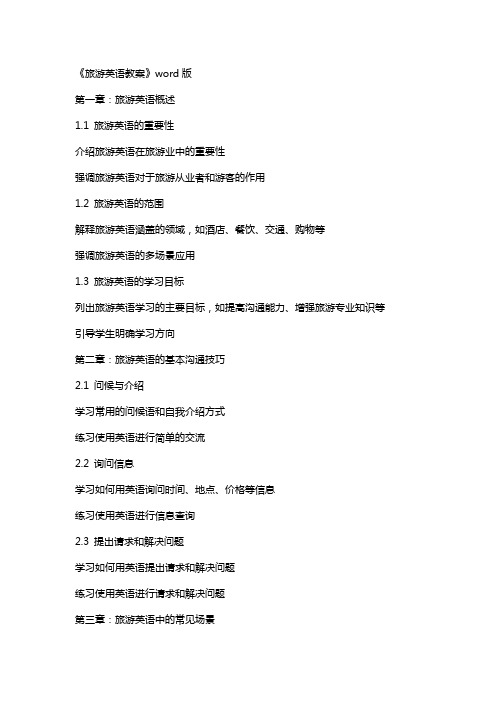
《旅游英语教案》word版第一章:旅游英语概述1.1 旅游英语的重要性介绍旅游英语在旅游业中的重要性强调旅游英语对于旅游从业者和游客的作用1.2 旅游英语的范围解释旅游英语涵盖的领域,如酒店、餐饮、交通、购物等强调旅游英语的多场景应用1.3 旅游英语的学习目标列出旅游英语学习的主要目标,如提高沟通能力、增强旅游专业知识等引导学生明确学习方向第二章:旅游英语的基本沟通技巧2.1 问候与介绍学习常用的问候语和自我介绍方式练习使用英语进行简单的交流2.2 询问信息学习如何用英语询问时间、地点、价格等信息练习使用英语进行信息查询2.3 提出请求和解决问题学习如何用英语提出请求和解决问题练习使用英语进行请求和解决问题第三章:旅游英语中的常见场景3.1 酒店入住与退房学习酒店入住和退房的相关英语表达练习使用英语进行酒店入住和退房的交流3.2 餐厅用餐学习餐厅用餐的相关英语表达练习使用英语进行点餐、用餐的交流3.3 交通出行学习交通出行的相关英语表达练习使用英语进行购票、问路等的交流第四章:旅游英语中的购物与娱乐4.1 购物学习购物的相关英语表达练习使用英语进行购物交流4.2 娱乐活动学习娱乐活动的相关英语表达练习使用英语进行娱乐活动交流4.3 旅游英语口语拓展学习一些旅游英语口语拓展表达练习使用英语进行更丰富的交流第五章:旅游英语中的文化差异与礼仪5.1 文化差异介绍不同国家的文化差异对旅游英语的影响强调理解和尊重不同文化的的重要性5.2 旅游礼仪学习旅游中的礼仪规范练习使用英语进行礼貌的交流和行为展示第六章:旅游英语中的餐饮服务6.1 餐厅用语学习在餐厅中常用的英语表达,如点餐、询问菜品、表达喜好等练习在模拟餐厅环境中进行点餐交流6.2 酒店客房服务学习酒店客房服务的相关英语表达,如订餐、叫醒服务、洗衣服务等练习使用英语进行客房服务的交流第七章:旅游英语中的交通出行7.1 飞机出行学习乘坐飞机的相关英语表达,如办理登机手续、询问航班信息、机场security 等练习使用英语进行飞机出行的交流7.2 火车旅行学习乘坐火车的相关英语表达,如购票、询问车次信息、火车站设施等练习使用英语进行火车旅行的交流第八章:旅游英语中的景点介绍8.1 自然风光学习描述自然风光的英语表达,如山脉、海滩、沙漠等练习使用英语进行自然风光的介绍8.2 人文景观学习描述人文景观的英语表达,如古迹、博物馆、城市建筑等练习使用英语进行人文景观的介绍第九章:旅游英语中的紧急情况应对9.1 疾病与意外学习在旅游过程中应对疾病和意外的基本英语表达练习使用英语进行求助和描述症状9.2 安全问题学习在旅游过程中应对安全问题的基本英语表达练习使用英语进行报警和求助第十章:旅游英语的综合应用10.1 模拟旅游场景设计一个综合性的旅游场景,如旅行社咨询、机场接机、酒店入住等让学生在模拟场景中综合运用旅游英语10.2 旅游英语口语测试设计一个旅游英语口语测试,包括常见场景的问答、角色扮演等评估学生的旅游英语口语水平和沟通能力重点和难点解析章节一:旅游英语概述难点解析:理解旅游英语在旅游业中的作用及其对旅游从业者和游客的意义。
旅游英语unit1

斯芬克斯是希腊神话中以隐谜害人的怪物,埃及 最大的胡夫金字塔前的狮身人面怪兽就是他。他 给俄狄浦斯出的问题是:什么东西早晨四只脚走 路,中午用两只脚走路,傍晚用三只脚走路?俄 狄浦斯回答:是人。在生命的早晨,他是个孩子, 用两条腿和两只手爬行;到了生命的中午,他变 成壮年,只用两条腿走路;到了生命的傍晚,他 年老体衰,必须借助拐杖走路,所以被称为三只 脚。俄狄浦斯答对了。斯芬克斯羞愧坠崖而死。 斯芬克斯之谜:常被用来比喻复杂、神秘、难于理 解的问题。
Origin of Halong Bay
在1500平方公里的海面上,山岛林立,星罗棋布,姿态 万千,这里究竟有多少岛屿多少山峰,至今没有精确的统 计数据,据说共有3000多座,仅命名的山、岛就有1000 多座。下龙湾的名称来历有种种传说:一说是上天遣神龙 降临北部湾,助越南人民抗击外侵,龙口吐出颗颗龙珠打 击侵略者,龙珠落进海里,化为岩石,耸立成山。还有人 说有一群白龙从远方飞来,被这里的绮丽风光所吸引,从 天上下来留在海湾里。白龙翻腾激浪,化作千姿百态的奇 山异岛。据科学工作者考证,这里是原来欧亚大陆的一部 分,后沉入海中,形成了这种自然奇观。
马超龙雀-中国旅游业标志的意义
1985年,马超龙雀被确定为中国旅游业的图形标志。 它的象征意义: 天马行空,逸兴腾飞,无所束缚,象征中国旅游 业的前景 马是古今旅游的重要工具,是奋进的象征,旅游 者可以在中国尽兴旅游 马超龙雀的青铜制品,象征着中国数千年光辉灿 烂的文化历史,显示文明古国的伟大形象,吸引 旅游者
Talk about Tourism Industry
It’s a bit business. It spas the globe . It’s called Sunrise Industry. It provides employment. It increases the revenue. It solves the poverty problem. It promotes the development of related industries such as catering、hotel. It helps to protect the national culture. It is the largest and fastest growing industry in the world.
旅游英语Chapter One

2. Routine Dialogues 1) on the airplane (page 2-3) to find one’s seat to ask for drink/food/things like blanket… 2) at the Port of Entry (page 3) 3) At the Tourist Information (page 3-4)
Chapter One Entering a Country
Teaching Set-up
Part I Leading-in Activities Part II Routine Dialogues
Part III Problems Prediction
Part IV Exercises Plaza Part V Practical Writing Part VI Tips for Travel Part VII Cultural Dissert
2.机场指示牌主要英语词汇或表达
• • • • • • • • • • • • • • • • • Detour 马路施工,请绕行 Airport Terminal 机场候机楼 International Departure 国际航班出港 Domestic Departure 国内航班出站 Regular Flight 正常航班 Non-scheduled Flight 非正常航班 Arrivals 进港、到达 Customs 海关 Gate / Departure Gate 登机口 Departure Lounge 候机室 FLT No (flight number) 航班号 Scheduled Time (SCHED) 预计时间 Actual Time 实际时间 Landed 已降落 Arriving from 来自…… Departure to 前往...... Departure Time 起飞时间
旅游英语 清华大学出版社完整Unit1ppt课件
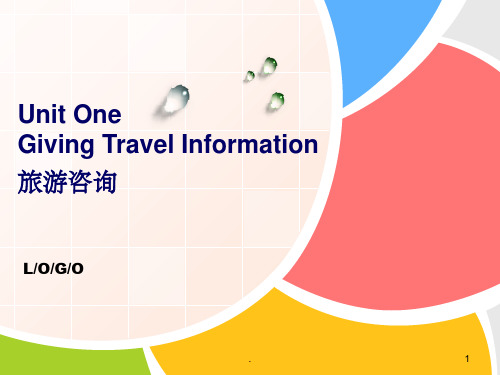
L/O/G/O
.
1
Unit Objectives (单元目标)
• After learning this unit, you should
• ——understand what and how to give travel information;
.
6
Dialogue 1
• c. Listen to the dialogue again and supply the missing words.
• 1. I’m sorry we are all booked up for Flight 802 on that day. • 2. Shall I book you a seat? • 3. You want to go first class or coach? • 4. Can you also put me on the waiting list for the 12th?
票已订完。 • B: 那还有别的吗? • A: 有一次航班在九月13日周二上午9:30起飞。我能为您订个座位吗? • B: 哦... 是直航对吗? • A: 是的。您愿意订头等舱还是经济舱的机票? • B: 我想订头等舱的机票。多少钱? • A: 单程是176美元。 • B: 好的,我将订周二9:30的机票。 • A: 一张807次航班周二早晨9:30飞往波斯顿的机票。对吗,先生? • B: 对。你能把我放到12号等候名单中吗? • A: 当然可以。请您告诉您的名字和联系方式。 • B: 我叫Louis Anderson。52378651您能和我联系。 • A: 若取消我将通知您。 • B: 非常感谢。 • A: 不客气。
旅游英语电子课件Unit1Overview of the Tourism Industry

Correct order: ④①②③
Look and Learn Dialogue Reading Learn More New Words and Phrases
Unit 1
Lesson 14
旅游服务体系六大构成要素
There are six sectors in the tourism industry. They are attractions, travel trade, accommodation, food & beverage, transportation and tourism services.
recreation vehicle transportation
beach attraction
currency exchange travel trade
motel accommodation
Look and Learn Dialogue Reading
information center tourism service sector
旅游业有六大构成要素,它们是景点、旅游贸易、住宿、餐饮、交通 和旅游服务。
1. Attractions Attractions, also known as places of interest, include natural and cultural tourist spots, such as beaches, mountains, rivers, museums, theme parks and heritage buildings. 1. 景点 景点也称名胜古迹,包括自然和文化景观,如沙滩、山川、博物馆、 主题公园和古建筑。
- 1、下载文档前请自行甄别文档内容的完整性,平台不提供额外的编辑、内容补充、找答案等附加服务。
- 2、"仅部分预览"的文档,不可在线预览部分如存在完整性等问题,可反馈申请退款(可完整预览的文档不适用该条件!)。
- 3、如文档侵犯您的权益,请联系客服反馈,我们会尽快为您处理(人工客服工作时间:9:00-18:30)。
旅游英语教程
修月祯 主 编
Unit 1 Tourism Industry and Tourists
Part I Listening and Speaking
❖ Passage 1
New Words & Expressions
Chinese Lunar New Year reservation n. analyst n. appreciation n. venture v. outbound adj. China’s Exit-Entry Bureau inbound adj. year-on-year
喜欢的人(或物) 教师在班里不应该偏爱某些学生。
❖ Dialog
New Words & Expressions
the Lantern Festival the Tomb-Sweeping Day the Dragon Boat Festival the Mid-Autumn Festival scrap v. adjacent adj. netizen n. deprive v. entitle vt. heritage n. revise v. revision n.
n. 残留物 遗体
The remains of the meal are[is] in the refrigerator. 剩饭在冰箱里。
To pay respect to the remains of sb. 瞻仰遗容
far from 远离(某地) 远不是
people working far from their hometowns 远离家乡工作的人
陈规的,典型的 连续的 住宅,家 国内旅游(一国居民在本国内旅游) 入境旅游 出境旅游 境内旅游(国内旅游加上入境旅游) 国家旅游(国内旅游加上出境旅游) 国际旅游(入境旅游加上出境旅游)
❖ Treasure Box
I have an open ticket. Now I want to make airline
Part II Reading
❖ Text A
New Words & Expressions
acquisition n. motivation n. exploration n. emerge v. domesticate v.
stabilize v. accommodation n. establishment n. retail n. hospitality n. temporary adj. destination n. undertake v.
Mathieson and Wall (1982)(2) created a good working definition of tourism as “the temporary movement of people to destinations outside their normal places of work and residence, the activities undertaken during their stay in those destinations, and the facilities created to cater to(3) their needs.”
The show was far from being a failure; it was a great
success. 这个表演不仅没有失败,而且是很成功的。
entitle v. 给…… 题名,给予……权利
be entitled to do sth. 被赋予……权利
be entitled to sth. 被赋予……权利
Any attempt to define tourism and to describe its scope fully must consider the various groups that participate in and are affected by this industry. Their perspectives are vital to the development of a comprehensive definition. Four different perspectives of tourism can be identified:
I have no reservation about hiring him. 雇用他我没有任何意见。
I am willing to agree to the proposal with one reservation. 我很同意这个建议,但有一点保留意见。
保留区
The military reservation was five miles away from here. 军事保留地距离这里五英里。
Tourism is a collection of activities, services and industries that delivers a travel experience, including transportation, accommodations, eating and drinking establishments, retail shops, entertainment businesses, activity facilities and other hospitality services provided for individuals or groups traveling away from home.
获得 动机 探险,探索 出现,形成 驯养
稳定 住宿 公司,企业 零售 殷勤好客 暂时的,临时的 目的地 承担
❖ New Words & Expressions
cater v. host v. & n. psychic adj. jurisdiction n. expenditure n. imprecise adj. subset n. exertion n. hybrid n. facet n. trekking n. alternative adj. sustainable adj. consumptive adj. tangible adj. artifact n. backpacking n.
When you say blue is your favorite color, you can say blue
favorite adj.
喜欢的,中意的
is your color. 蓝色是你最喜欢的颜色,可以说,蓝色是你的颜色。
n.
A teacher shouldn’t have favorites in the class.
According to Macintosh and Goeldner (1986)(4) tourism is “the sum of the phenomena and relationships arising from(5) the interaction of tourists, business suppliers, host(6) governments and host communities in the process of attracting and hosting these tourists and other visitors.”
迎合,投合 做主人招待;主人 精神的,心灵的 管辖区 花费,开销 不精确的 子集 努力,尽力
混合物 (事物的)方面 长途跋涉 选择性的 可持续的 消费的,消耗性的 可触知的 人造物品 背着包徒步旅行
Tourism
Since the beginning of time humans have traveled. Food, water, safety or acquisition of resources (trade) were the early travel motivations. But the idea of travel for pleasure or exploration soon emerged. Travel has always depended upon technology to provide the means or mode of travel(1). The earliest travelers walked or rode domesticated animals. The invention of the wheel and the sail provided new modes of transportation. Each improvement in technology increased individuals’ opportunities to travel. As roads were improved and governments stabilized, interest in travel increased for education, sightseeing, and religious purposes.
Every child in China is entitled to compulsory education at school. 在中国,每一个孩子都有接受义务教育的权利。
❖ Notes
(1) adjacent to 邻近的 (2) in a row 连续
(3) …deprives people working far from their hometowns of the chance to go back home for family gathering. deprives sb. of sth. 剥夺某人 做某事的权利
What is your judgment on…? revise the holidays.)
